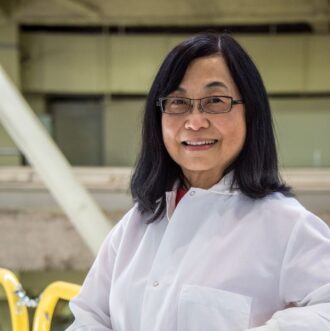Hoi-Ying Holman
Chemist Senior Scientist
Director of Berkeley Synchrotron Infrared Structural Biology Program

Building: 70A, Room 3317L
Mail Stop: 70A-3317
Phone: (510) 486-5943
Fax: (510) 486-7152
HYHolman@lbl.gov
https://bsisb.lbl.gov
Links
Biography
Hoi-Ying Holman is a senior scientist in the Molecular Biophysics and Integrated Bioimaging (MBIB) Division of Berkeley Lab’s Biosciences Area and Director of the Berkeley Synchrotron Infrared Structural Biology (BSISB) imaging program at the Advanced Light Source (ALS). She received her PhD from the University of California at Berkeley. With team members Drs. Sun Choi, Liang Chen, and Giovanni Birarda, she was awarded a 2014 R&D 100 award for their development of the Berkeley Lab Multiplex Chemotyping Microarray (MCM).
Research Interests
Hoi-Ying’s research interests are in microbial ecology, geomicrobiology, bioenergy, bioremediation, and bioavailability of chemicals to ecological receptors. In the BSISB imaging program at the ALS, she focuses on developing and providing research communities new synchrotron infrared (SIR) technologies for deciphering the relationship between genome and functional processes, and identifying the connection between the genome and natural environments. Current technologies in active development are: SIR nano-spectroscopy, SIR plasmon resonance microscopy, and the integration of SIR spectromicroscopy with ambient IR laser ablation (AIRLAB) mass spectrometry.
Programs & Initiatives
Recent Publications
Related News
University of Duisburg-Essen Delegation Explores Collaborative Opportunities with Lawrence Berkeley National Laboratory
Building on a Memorandum of Understanding signed between UDE and Berkeley Lab researchers, a kick-off meeting focused on future collaborations in the fields of genomics, structural biology, bioimaging, and water research.
Watching the Enzymes that Convert Plant Fiber into Simple Sugars
Researchers in the Berkeley Synchrotron Infrared Structural Biology (BSISB) Imaging Program developed a technique that combines a novel microfluidic device and infrared spectroscopy to study how a cellulose-degrading enzyme works in real time.
Whip It: Novel Liquid Jet Makes Droplets March to the Beat
An interdisciplinary team has developed a first-of-its-kind, steady-state whipping liquid microjet that produces droplets of uniform size and spacing in a two-dimensional profile. The technology could ultimately lead to advancements in structural biology, climate science, and several industries.



